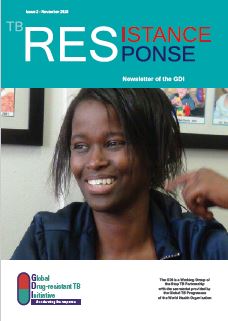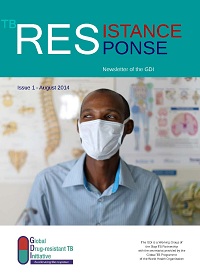Meetings
Seventh core group meeting of the Global Drug-resistant TB Initiative in Geneva, Switzerland
Sixth core group meeting of the Global Drug-resistant TB Initiative in Liverpool, UK
Fifth core group meeting of the Global Drug-resistant TB Initiative in Geneva, Switzerland
New DR-TB drug introduction experience exchange workshops for the WHO Regions
New drugs approved by regulatory authorities, notably bedaquiline and delamanid, as well as re-purposed drugs classified as Group 5 in the WHO Companion Handbook to the 2011 Guidelines for Programmatic Management of Drug-resistant Tuberculosis (PMDT) are increasingly being introduced in the treatment regimens for MDR-TB and XDR-TB patients. The WHO's Global TB Programme issued interim policy guidance on the use of bedaquiline in the treatment of MDR-TB in mid-2013 and on the use of Delamanid in October 2014. However limited data, particularly on safety, are currently available on these new drugs, and also on the safety and efficacy of the re-purposed drugs listed under Group 5. It is therefore imperative that adequate provisions for safe, rational and effective use of these drugs be put in place, specifically ensuring appropriate selection of eligible patients, informed consent, design of effective regimens, and close patient monitoring and evaluation. Both drug stock-outs and overstocking should be avoided and orders aligned to treatment regimens recommended by WHO. Furthermore, WHO/GTB is recommending that countries introducing new and re-purposed Group 5 drugs establish active pharmacovigilance to rapidly detect potential drug adverse events.
Given the essential role of the regional Green Light Committees (rGLCs) as the primary point of contact for country guidance and advice on PMDT, it is very important that rGLC members and PMDT consultants are fully au fait with current WHO policy recommendations on the use of new drugs, as well as those in Group 5. Therefore a series of workshops have been planned by the WHO for the rGLC members and their respective rGLC Secretariat Focal Points, whilst encouraging countries and partners to make use of the rGLC mechanism to ensure that treatment principles and drug orders are aligned with WHO guidelines.
Workshops held as yet are as follows:
- For the members of the rGLC for the European Region, the rGLC Secretariat Focal Point, and representatives of partner organizations - Copenhagen, Denmark, 22-23 September 2015.
- For the members of the rGLCs for the African and Eastern Mediterranean Regions, the rGLC Secretariat Focal Points, and representatives of partner organizations - Nairobi, Kenya, 4-5 November 2015.
- For the members of the rGLCs for the South East Asia and Western Pacific Regions, and representatives of partner organizations - Bangkok, Thailand, 24-25 February, 2016
- For the members of the rGLCs for the Americas Region, the rGLC Secretariat Focal Points, and representatives of partner organizations - Panama City, Panama, 18-19 April 2016.
The reports of these workshops are available here
Report of workshop on new DR-TB drugs for AFR and EMR, Nairobi, Kenya, 4-5 Nov 2015.
WHO HQ-EURO experience sharing workshop on new drugs for DRTB report 22-23 Sept 2015.
Report of workshop on new DR-TB drugs for SEAR and WPR, Bangkok, Thailand, 24-25 February , 2016.
Fourth Core Group meeting of the Global Drug-resistant TB Initiative (GDI), Capetown
01 December 2015
GDI/GLI Joint Partners Forum
Third Core Group meeting of the Global Drug-resistant TB Initiative (GDI) Geneva
01 May 2015
Second Core Group meeting of the Global Drug-resistant TB Initiative (GDI) Barcelona
27 October 2014
The second Core Group (CG) meeting of the Global Drug-resistant TB Initiative (GDI) was held on 27 October 2014 in Barcelona, Spain. All members of the CG, except for the SEA rGLC chair, attended the meeting, along with observers from the Global Laboratory Initiative (GLI), Global TB Drugs Facility (GDF), Global Fund (GF), Infection Prevention and Control (IC) sub-group and the USAID. The objectives of the meeting were:
- To follow up on recommendations and action points agreed upon during 1st GDI CG meeting and subsequent monthly teleconferences
- To provide an update on progress in global scale up of MDR-TB services and care
- To provide an update on the progress of the respective GDI Task Forces, and the request of the Infection Control (IC) sub-group
- To strengthen communication within GDI, and between the GDI and partners including the GF
- To discuss the GDI "Business Plan" and the work plan for 2014-15.
The participants were briefed about the activities of the GDI Secretariat since the first CG meeting in May 2014, as well as the progress made by the three taskforces formed after the first CG meeting.
A joint session of the GDI and GLI CGs discussed the ways forward to narrow the gap between the diagnosis and enrolment of MDR-TB cases globally. Further discussions will be held to finalise a number of joint GDI and GLI activities for 2015. The joint session was also addressed by Dr Mario Raviglione, Director GTB/WHO
The GDI CG members unanimously agreed to the movement of the IC sub-group under the GDI "umbrella".
Initial discussions on the contents of the GDI "Business Plan" were held. The CG members agreed that scope of the plan should be global in nature, and that the plan should build on the earlier transition framework developed in 2011. A tentative plan was made for a meeting of a small group of CG members early next year to draft the GDI document, which will include budget estimates for the global scale-up of MDR-TB services and care.
First Core Group meeting of the Global Drug-resistant TB Initiative (GDI)
1-2 May 2014
The first Core Group (CG) meeting of the Global Drug-resistant TB Initiative (GDI) was held on 1-2 May in Geneva chaired by Dr Charles Daley. All 16 members of the CG attended the meeting, along with observers from the Global Laboratory Initiative (GLI) and the Global TB Drugs Facility (GDF). On the first day of the meeting, the members were briefed on the how the GDI came to be established and its proposed role, on global progress in scale-up of MDR-TB services, key areas of work for the Stop TB Partnership in 2014 including those of the GDF, and the progress in implementation of regional plans in response to MDR-TB in each of the WHO Regions, and in particular the work of the respective 6 regional Green Light Committees (rGLCs). The second day of the meeting was devoted to the development of strategic priorities and activities of the GDI.
The following areas were actively discussed by the CG members:
- Need to improve capacity to treat MDR-TB patients ensuring alignment with the expansion of diagnostics, especially the rapid molecular tests.
- Low global treatment success rate (48%) amongst MDR-TB patients and specifically the high rates of "lost to follow-up" and "not evaluated", which significantly contribute to the overall low treatment success rates.
- Advocacy for MDR-TB needs to be strengthened for increasing the resources available for the required scale up of services.
- Need for rapid scale-up of second line drug susceptibility testing capacity in order to detect and correctly treat the XDR-TB cases.
- Need for agreed MDR-TB disease burden indicators and their appropriate use.
- Strengthening supply chain systems and access to quality assured second-line drugs through GDF support.
- Need for coordination of technical assistance being provided through the various funding agencies and technical partners.
- The essential need for the involvement of the private sector in programmatic management of DR-TB (PMDT) activities, however as yet this has not received the required attention that it deserves.
Based on the discussions, the following strategic priorities and activities were agreed by the CG members:
- Develop targeted advocacy strategies and resource mobilization for DR-TB management scale-up.
- Facilitate integration and coordination of efforts to align diagnostic services for patients with access to high-quality care.
- Build global consensus on the management of DR-TB for patient centred care delivery ("care for cure").
- Promote strategies to facilitate patient access to high-quality DR-TB care, through a long-term, in-country capacity building approach targeting both the public and private sector.
- Support prioritization of research to generate evidence for PMDT scale-up.
All Task Forces will be led by an identified GDI partner and progress in its work will be monitored by the Core Group on a regular basis.
MDR-TB Stakeholders meeting in Paris
27-28 October 2013
- Agenda and meeting presentations
- Estimates of the burden of disease caused by MDR- TB and monitoring the programmatic response
- Meeting report;
- Break-out group discussions on Patient Centred Approach;
- Meeting pics;
- Resources from partners;
Joint meeting of the global GLC Committee and the MDR-TB Core Group
18-19 April 2013



